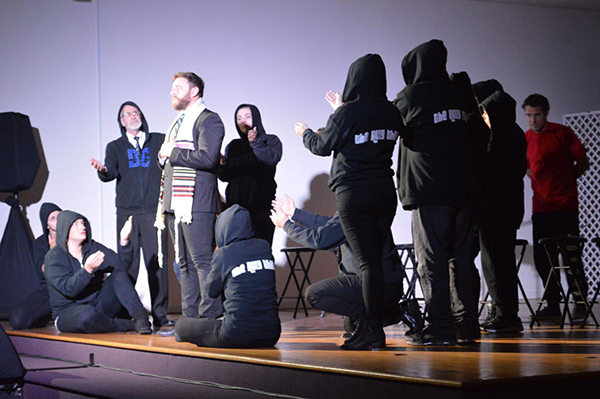11/09/2018
‘Freedom Song’ Rings in Homecoming of Sorts
- Share This Story
Article reprinted with permission from Cleveland Jewish News.

The cast of “Freedom Song” gathers around director Michael Kamenir, who gives the cast notes prior to the performance at B’nai Jeshurun Congregation in Pepper Pike. The cast said the Shema and the serenity prayer before taking the stage.
The performance of “Freedom Song” Nov. 1 at B’nai Jeshurun Congregation in Pepper Pike was a homecoming of sorts.
The musical that focuses on addiction featured a cast of recovering addicts from a Jewish treatment center called Beit T’Shuvah in Los Angeles. In its 12th year of production, the Cleveland performance was one of its five performances in a 12-day tour.
The founder of Beit T’Shuvah, Rabbi Michael Borovitz, grew up in Cleveland Heights, attended Temple on the Heights, B’nai Jeshurun’s predecessor, and wound up in a California prison as a result of his alcoholism. In 1988, after his release, he founded the nonprofit, nonsectarian Jewish treatment center. He was ordained at the University of Judaism in 2000. His memoir is “The Holy Thief: A Con Man’s Journey from Darkness to Light.”
Ace, who plays the rabbi in “Freedom Song,” thanks Mildred Borovitz for the work her son, Rabbi Michael Borovitz, does at Beit T’Shuvah, a nonprofit, nonsectarian Jewish treatment center in Los Angeles.
His mother, Mildred Borovitz, was one of about 150 people in the audience at B’nai Jeshurun. A cast member, Ace (addicts went by first names only), who played the rabbi in “Freedom Song,” approached her.
“Your son saved my life,” he told her as he took her hand. “This program completely transformed my life and my family’s life.”
Two years sober from a seven-year opiate addiction, Ace said he is running a mentoring program for teens.
Rabbi Hal Rudin-Luria spoke about addiction prior to the presentation and about his connection to Rabbi Borovitz.
“I met Mark when we were both studying in rabbinical school together in Jerusalem,” said Rudin-Luria, who spent the summer of 1999 as a rabbinic intern at Beit T’Shuvah. He said he learned then “that addiction does not discriminate, that Jews, just as much as any other people, face the challenge and struggle living with addiction.”
He recently attended “It Happens Here: Addiction and Mental Health Issues in the Jewish Community,” a
five-hour presentation on the opioid crisis geared toward clergy.
“There I learned more along with colleagues and other Jewish professionals and community leaders,” he said, “that addiction and substance abuse is a disorder, it’s a disease, it’s an illness, and it hijacks the brain.”
“Freedom Song” takes its themes from Exodus: slavery, plagues, oppression, alienation and redemption reframes them in the language of recovery. On one side of the stage a family celebrates Passover; on the other, a 12-step meeting takes place.
Addicted daughter Shira makes an unexpected appearance to her family’s seder.
“You have no right to be here,” says her father, when she arrives.
“I just wanted to be home for Pesach,” Shira answers.
“This is no longer your home,” he retorts.
The musical interweaves original music with familiar melodies such as a melody commonly used for the Four Questions, the spiritual “Let My People Go,” a melody from “Fiddler on the Roof.”
“Daddy, I stole your trust. I lost my dignity. I almost lost my soul,” Shira said. “Instead of reading from the Haggadah, I would like to say something from my heart to my family. Then, I will leave your home. Love me or not, whether you believe me or not, I still love all of you. I know I’ve hurt each one of you beyond repair.”
After the performance, the cast split into two groups to meet with about 50 teens and about 30 adults for the question-and-answer sessions. Audience members had questions about so-called tough love and enabling and about steps to take to safeguard their children against addiction.
On Nov. 2, the cast led speaking programs at Gross Schechter Day School in Pepper Pike and Fuchs Mizrachi School in Beachwood.
Mildred Borovitz recalled when Beit T’Shuvah first started, in what she called one of the most dangerous neighborhoods in Los Angeles.
“I used to be afraid to walk out of the car,” she said, contrasting that with the treatment center today. “They had no money, very few people that were really aware of what was going on. It’s a beautiful place for those who need it.”
This event was sponsored by Jewish Federation of Cleveland, @akiva High School, Bellefaire JCB, B'nai Jeshurun Congregation, Jewish Education Center of Cleveland, and The Semi J. and Ruth W. Begun Foundation, a Supporting Foundation of the Jewish Federation of Cleveland,

